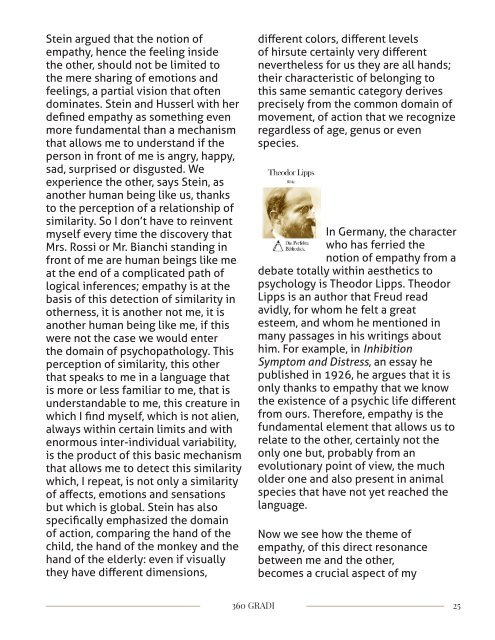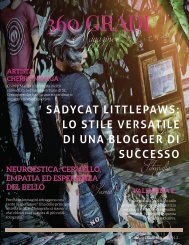360 GRADI MAGAZINE January/February 2021
The January/February 2021 issue of 360GRADI Magazine is online! All updates on our Fan Page: https://www.facebook.com/360gradisecondlifesionisti Don't forget to take our kiosk to put in your land! You won't miss an issue and you'll give a useful service to your visitors for free. Take your kiosk: http://maps.secondlife.com/secondlife/Petopia/217/216/4087 360 GRADI Magazine is the trendy, elegant, refined, and sophisticated publishing about Second Life (the virtual world by Linden Lab). Out every two months.
The January/February 2021 issue of 360GRADI Magazine is online!
All updates on our Fan Page: https://www.facebook.com/360gradisecondlifesionisti
Don't forget to take our kiosk to put in your land! You won't miss an issue and you'll give a useful service to your visitors for free.
Take your kiosk: http://maps.secondlife.com/secondlife/Petopia/217/216/4087
360 GRADI Magazine is the trendy, elegant, refined, and sophisticated publishing about Second Life (the virtual world by Linden Lab).
Out every two months.
You also want an ePaper? Increase the reach of your titles
YUMPU automatically turns print PDFs into web optimized ePapers that Google loves.
Stein argued that the notion of<br />
empathy, hence the feeling inside<br />
the other, should not be limited to<br />
the mere sharing of emotions and<br />
feelings, a partial vision that often<br />
dominates. Stein and Husserl with her<br />
defined empathy as something even<br />
more fundamental than a mechanism<br />
that allows me to understand if the<br />
person in front of me is angry, happy,<br />
sad, surprised or disgusted. We<br />
experience the other, says Stein, as<br />
another human being like us, thanks<br />
to the perception of a relationship of<br />
similarity. So I don’t have to reinvent<br />
myself every time the discovery that<br />
Mrs. Rossi or Mr. Bianchi standing in<br />
front of me are human beings like me<br />
at the end of a complicated path of<br />
logical inferences; empathy is at the<br />
basis of this detection of similarity in<br />
otherness, it is another not me, it is<br />
another human being like me, if this<br />
were not the case we would enter<br />
the domain of psychopathology. This<br />
perception of similarity, this other<br />
that speaks to me in a language that<br />
is more or less familiar to me, that is<br />
understandable to me, this creature in<br />
which I find myself, which is not alien,<br />
always within certain limits and with<br />
enormous inter-individual variability,<br />
is the product of this basic mechanism<br />
that allows me to detect this similarity<br />
which, I repeat, is not only a similarity<br />
of affects, emotions and sensations<br />
but which is global. Stein has also<br />
specifically emphasized the domain<br />
of action, comparing the hand of the<br />
child, the hand of the monkey and the<br />
hand of the elderly: even if visually<br />
they have different dimensions,<br />
different colors, different levels<br />
of hirsute certainly very different<br />
nevertheless for us they are all hands;<br />
their characteristic of belonging to<br />
this same semantic category derives<br />
precisely from the common domain of<br />
movement, of action that we recognize<br />
regardless of age, genus or even<br />
species.<br />
In Germany, the character<br />
who has ferried the<br />
notion of empathy from a<br />
debate totally within aesthetics to<br />
psychology is Theodor Lipps. Theodor<br />
Lipps is an author that Freud read<br />
avidly, for whom he felt a great<br />
esteem, and whom he mentioned in<br />
many passages in his writings about<br />
him. For example, in Inhibition<br />
Symptom and Distress, an essay he<br />
published in 1926, he argues that it is<br />
only thanks to empathy that we know<br />
the existence of a psychic life different<br />
from ours. Therefore, empathy is the<br />
fundamental element that allows us to<br />
relate to the other, certainly not the<br />
only one but, probably from an<br />
evolutionary point of view, the much<br />
older one and also present in animal<br />
species that have not yet reached the<br />
language.<br />
Now we see how the theme of<br />
empathy, of this direct resonance<br />
between me and the other,<br />
becomes a crucial aspect of my<br />
<strong>360</strong> <strong>GRADI</strong><br />
25











